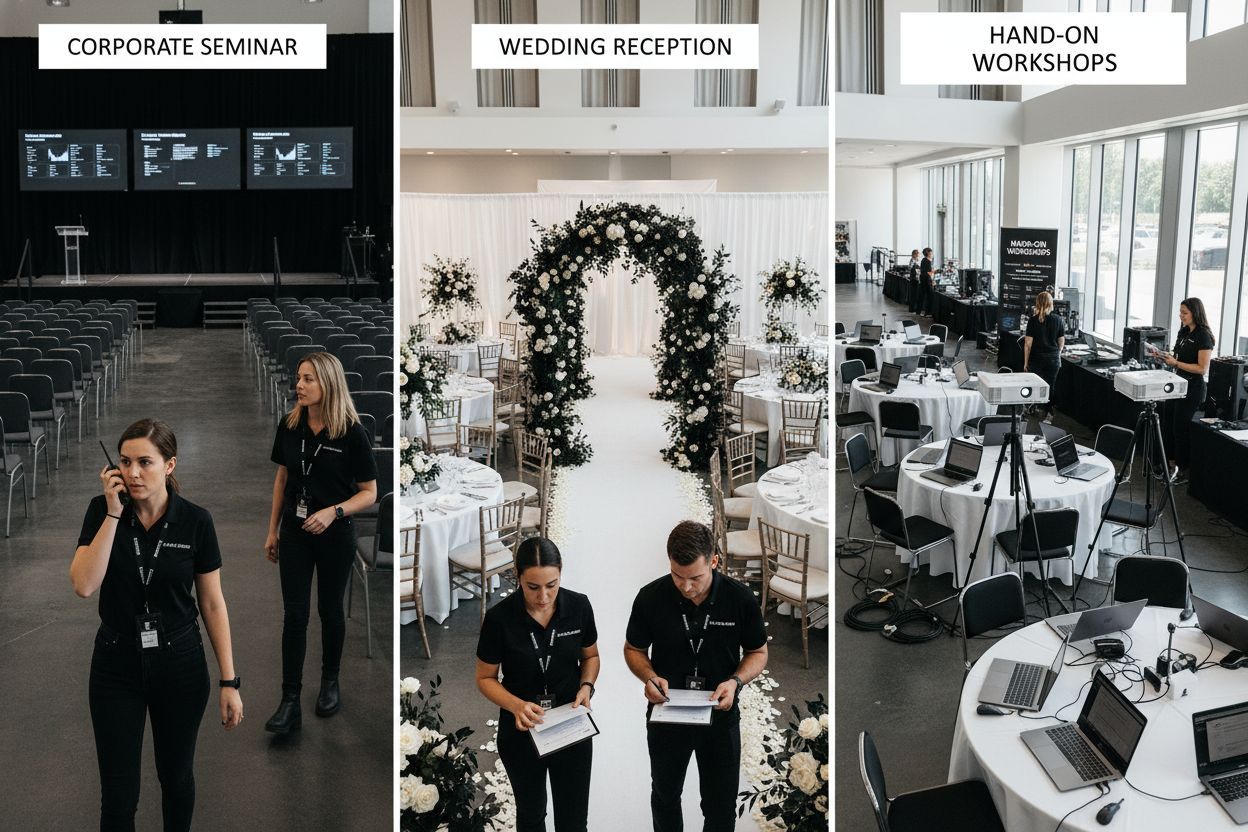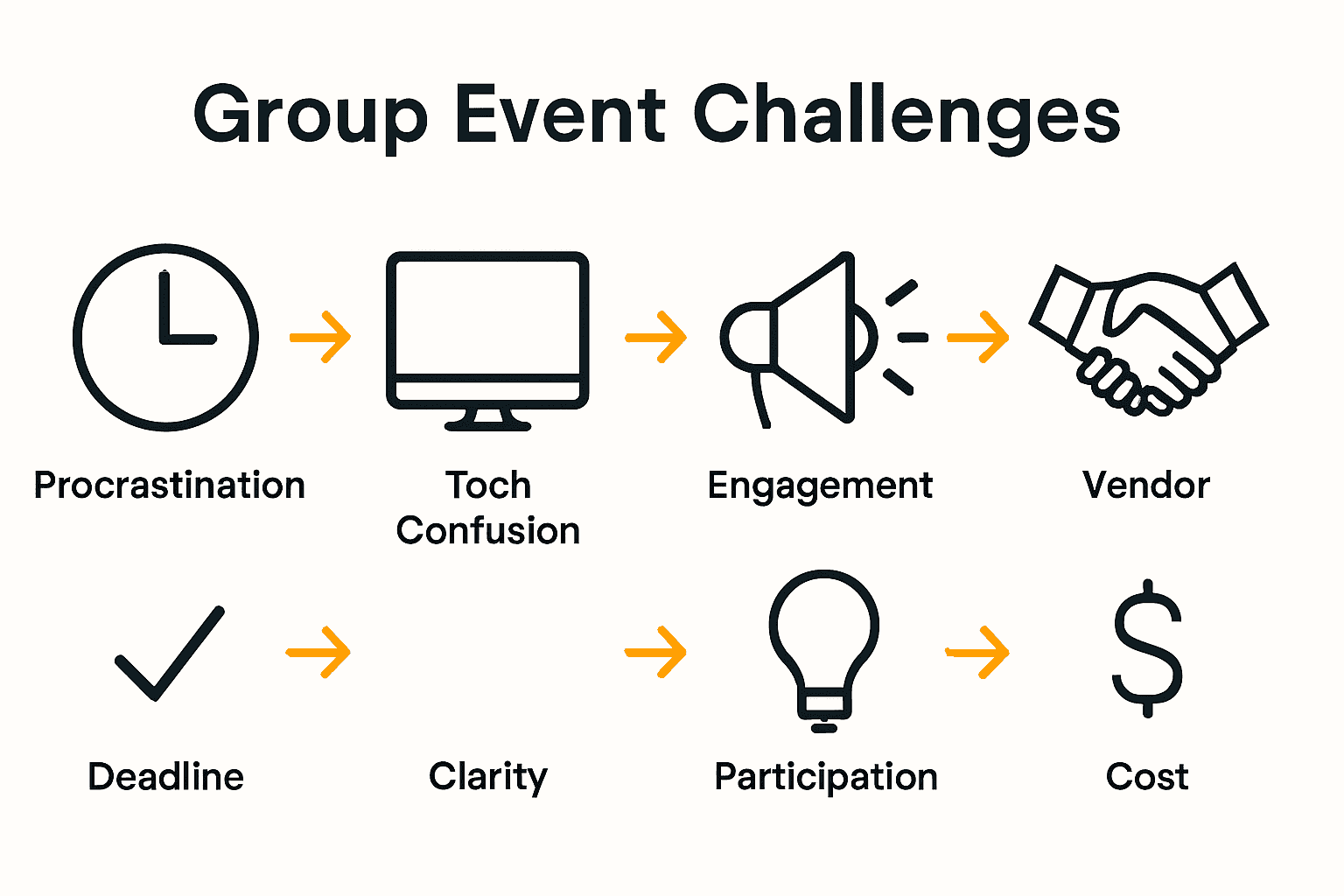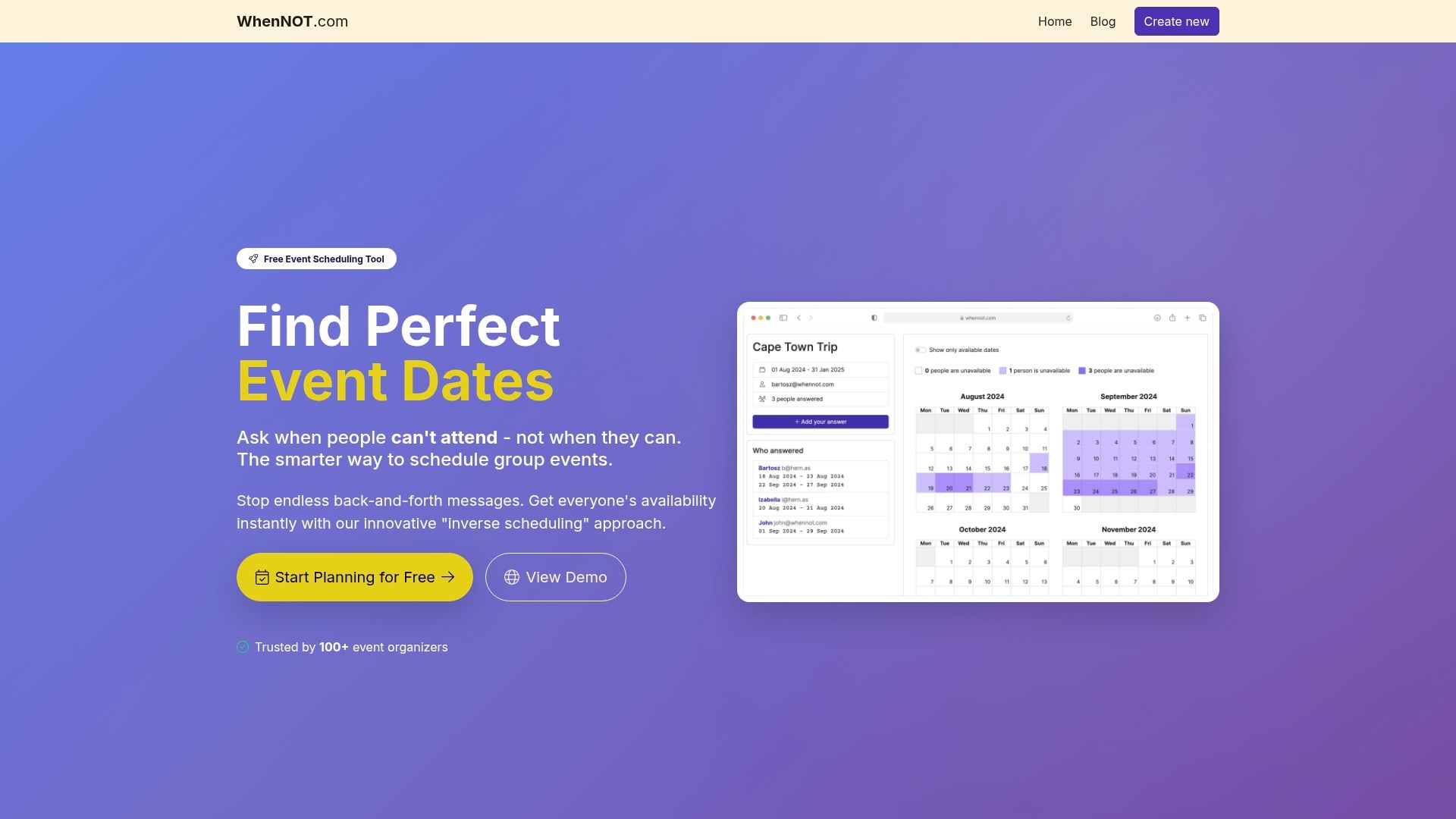Did you know that over 70 percent of group events face major planning challenges even before invitations go out? Organizing a successful gathering takes much more than picking a date and sending reminders. With complex logistics, diverse goals, and high expectations, every detail matters. Mastering the group event organization process helps you avoid common pitfalls and turn any gathering into a smooth, memorable experience for everyone involved.
Key Takeaways
| Point | Details |
|---|---|
| Event Purpose and Goals | Clearly define the event's purpose and objectives to shape all planning elements effectively. |
| Critical Roles | Assign distinct responsibilities within the event organizing team to ensure streamlined operations and accountability. |
| Systematic Planning Flow | Follow a structured planning process from initial logistics assessment to event execution to enhance efficiency and success. |
| Proactive Challenge Management | Anticipate potential challenges and prepare flexible strategies to navigate obstacles and maintain participant engagement. |
Table of Contents
- Defining Group Event Organization Process
- Main Types of Group Events Explained
- Step-By-Step Group Event Planning Flow
- Key Roles and Responsibilities of Organizers
- Common Challenges and How to Avoid Them
Defining Group Event Organization Process
Group event organization is the strategic process of planning and executing gatherings that bring multiple people together for a shared purpose. Event management transforms the complex challenge of coordinating multiple participants, resources, and logistics into a structured, systematic approach. Read more about community event planning strategies to enhance your organizational skills.
According to research from Les Roches, defining an event's purpose and goals serves as the strategic foundation for successful group event planning. This initial clarity helps shape critical elements like:
- Event tone and atmosphere
- Budget allocation
- Guest list composition
- Event format selection
- Success measurement metrics
At its core, event management involves a comprehensive set of interconnected tasks that go far beyond simple scheduling. According to Wikipedia, these tasks include complex coordination efforts such as:
- Budgeting and financial planning
- Venue selection and coordination
- Obtaining necessary permits
- Logistical arrangements
- Catering management
- Security planning
- Vendor relationship management
Successful group event organization requires meticulous attention to detail, strategic thinking, and the ability to anticipate and solve potential challenges before they emerge. By understanding these fundamental principles, event organizers can transform potential chaos into seamless, memorable experiences.
Main Types of Group Events Explained
Group events span a diverse landscape of gatherings, each designed with unique objectives and participant experiences in mind. Learn more about coordinating complex group events to navigate different event types effectively.
According to research from The Brewery, seven primary types of group events emerge, each serving distinct functions:
- Meetings: Structured professional gatherings like board meetings or team discussions
- Exhibitions: Showcase events displaying products, services, or artistic work
- Weddings: Celebratory social events marking significant personal milestones
- Training Events: Skill development and educational programs
- Workshops: Interactive learning sessions with hands-on components
- Talks: Knowledge-sharing presentations by experts
- Networking Events: Opportunities for professional and social connections
Wikipedia highlights that corporate entertainment events represent another significant category, combining professional and celebratory elements. These events include:
- Conventions and conferences
- Company retreats
- Holiday parties
- Private concerts or entertainment gatherings
These corporate events serve multiple purposes: team building, professional development, stakeholder engagement, and organizational culture reinforcement. Whether formal or casual, each event type requires tailored planning strategies to ensure meaningful participant experiences and achieve specific organizational objectives.

Here's a comparison of the main group event types and their typical objectives:
| Event Type | Typical Objectives | Example Activities |
|---|---|---|
| Meetings | Decision-making Alignment | Board discussions Team briefings |
| Exhibitions | Product display Networking | Trade shows Art showcases |
| Weddings | Celebration Milestone marking | Ceremonies Receptions |
| Training Events | Skill development Education | Workshops Seminars |
| Workshops | Hands-on learning Interaction | Group exercises Interactive tasks |
| Talks | Knowledge sharing Inspiration | Keynotes Expert presentations |
| Networking Events | Relationship building Collaboration | Mixers Speed networking |
| Corporate Entertainment | Team building Recognition | Retreats Company parties Private concerts |
Step-By-Step Group Event Planning Flow
Group event planning requires a systematic approach that transforms complex organizational challenges into smooth, well-executed experiences. Explore advanced event coordination strategies to streamline your planning process.
Here's a comprehensive flow for successful group event organization:
- Define Event Purpose
- Clarify core objectives
- Identify target audience
- Establish desired outcomes
- Initial Logistics Assessment
- Determine potential dates
- Estimate expected participant count
- Assess budget constraints
- Select preliminary venue options
- Detailed Planning Phase
- Develop comprehensive event timeline
- Create detailed participant communication strategy
- Design precise scheduling framework
- Confirm specific venue and resources
- Participant Coordination
- Send invitations
- Track RSVPs
- Manage participant availability
- Handle registration or enrollment processes
- Execution Preparation
- Confirm all logistical arrangements
- Finalize vendor contracts
- Prepare contingency plans
- Conduct final participant communication
- Event Implementation
- Execute planned activities
- Monitor real-time participant engagement
- Address unexpected challenges
- Ensure smooth operational flow
Successful group event planning demands flexibility, strategic thinking, and meticulous attention to detail. By following this structured approach, organizers can transform potential complexity into memorable, well-coordinated experiences that meet or exceed participant expectations.
Key Roles and Responsibilities of Organizers
Event organization is a collaborative effort that requires clear role definition and strategic team coordination. Learn more about effective team management for group events to optimize your event planning process.
According to research from Wrike, typical event teams comprise several critical roles, each with specialized responsibilities:
- Event Marketer: Manages promotional strategies and communication channels
- Program Administrator: Designs and oversees event content and scheduling
- Accountant: Handles financial planning, budgeting, and expense tracking
- Event Manager: Coordinates overall event logistics and team activities
- Volunteers/Staff: Execute ground-level event operations
According to Accruent, successful team organization hinges on two fundamental principles:
- Clearly Defined Responsibilities
- Establish precise role boundaries
- Document individual deliverables
- Set measurable performance expectations
- Robust Communication Frameworks
- Create transparent communication channels
- Define reporting structures
- Implement regular check-in mechanisms
- Develop contingency communication protocols
Effective event teams function like well-synchronized machinery, where each member understands their unique contribution to the collective goal. By investing time in role clarity and communication strategy, organizers can transform potential chaos into a streamlined, efficient event planning process that delivers exceptional results.
Common Challenges and How to Avoid Them
Group event planning involves navigating a complex landscape of potential obstacles that can derail even the most meticulously organized gatherings. Discover strategies for overcoming event planning challenges to ensure smooth execution.
According to VFairs, several critical challenges emerge in modern event organization:
- Attendee Procrastination: Last-minute registrations and responses
- Technology Confusion: Overwhelming number of event platforms
- Engagement Drop-off: Maintaining participant interest
- Vendor Management: Coordinating multiple service providers
Research from Noshie Events highlights additional strategic challenges:
- Budget Constraints
- Seek sponsorship opportunities
- Create flexible financial contingency plans
- Prioritize essential event elements
- External Complications
- Develop backup venue strategies
- Create detailed vendor contracts
- Implement digital documentation systems
- Design immersive contingency experiences
Proactive solutions include:
- Early communication and nurturing campaigns
- Pilot testing technology before full implementation
- Defining clear success metrics before tool selection
- Creating interactive and engaging content
- Establishing centralized communication channels
Successful event organizers anticipate challenges, remain adaptable, and transform potential obstacles into opportunities for creating memorable experiences. By maintaining strategic flexibility and a solution-oriented mindset, you can navigate the most complex event planning scenarios with confidence.

Simplify Group Event Planning with WhenNOT
Are you struggling to coordinate schedules and manage last-minute changes for your group events? If finding the perfect date feels overwhelming, especially when dealing with participant procrastination and endless availability conflicts, you are not alone. As highlighted in our guide, success depends on clear communication, fast feedback, and effortless management of everyone’s busy days. Relying on outdated scheduling methods can drain your energy and sabotage your event’s momentum.

Take control and create truly seamless group experiences today. Switch to WhenNOT and experience the difference of our unique inverse scheduling approach. Skip the endless back-and-forth. Allow participants to quickly block off their unavailable days with no registration required. Try WhenNOT today for free and see how easy group event organization can be. The sooner you start, the sooner you will secure the best date and reduce planning stress for everyone.
Frequently Asked Questions
What are the key steps in the group event organization process?
The key steps include defining the event purpose, conducting an initial logistics assessment, detailed planning, participant coordination, execution preparation, and event implementation.
What types of group events can be organized?
Group events include meetings, exhibitions, weddings, training events, workshops, talks, networking events, and corporate entertainment events. Each type has unique objectives and requires tailored planning.
What roles are typically included in an event planning team?
Typical roles in an event planning team include event marketer, program administrator, accountant, event manager, and volunteers/staff, each with specific responsibilities to ensure the event runs smoothly.
What are some common challenges faced during group event planning?
Common challenges include attendee procrastination, technology confusion, engagement drop-off, and vendor management. Strategies to overcome these challenges involve proactive communication, clear budgeting, and contingency planning.
